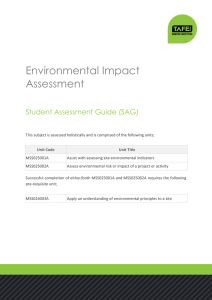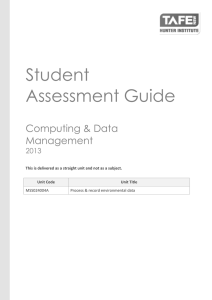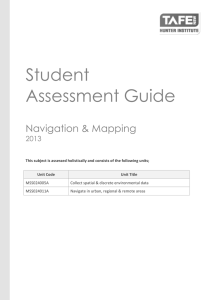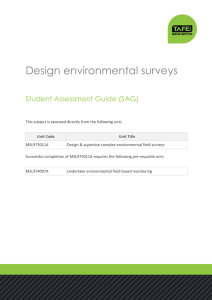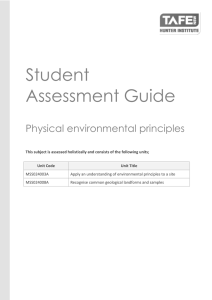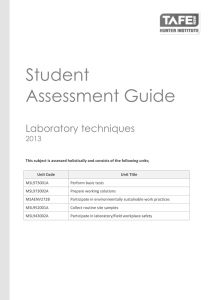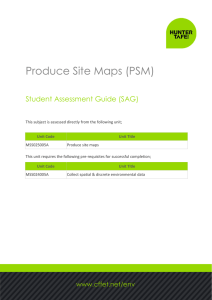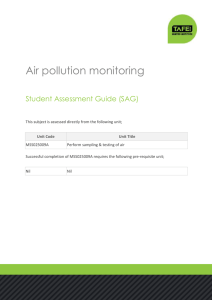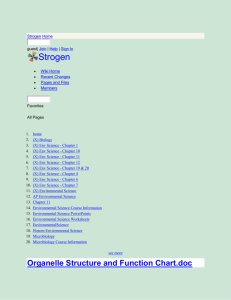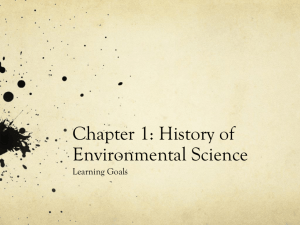Environmental Management Systems Student Assessment Guide (SAG)
advertisement
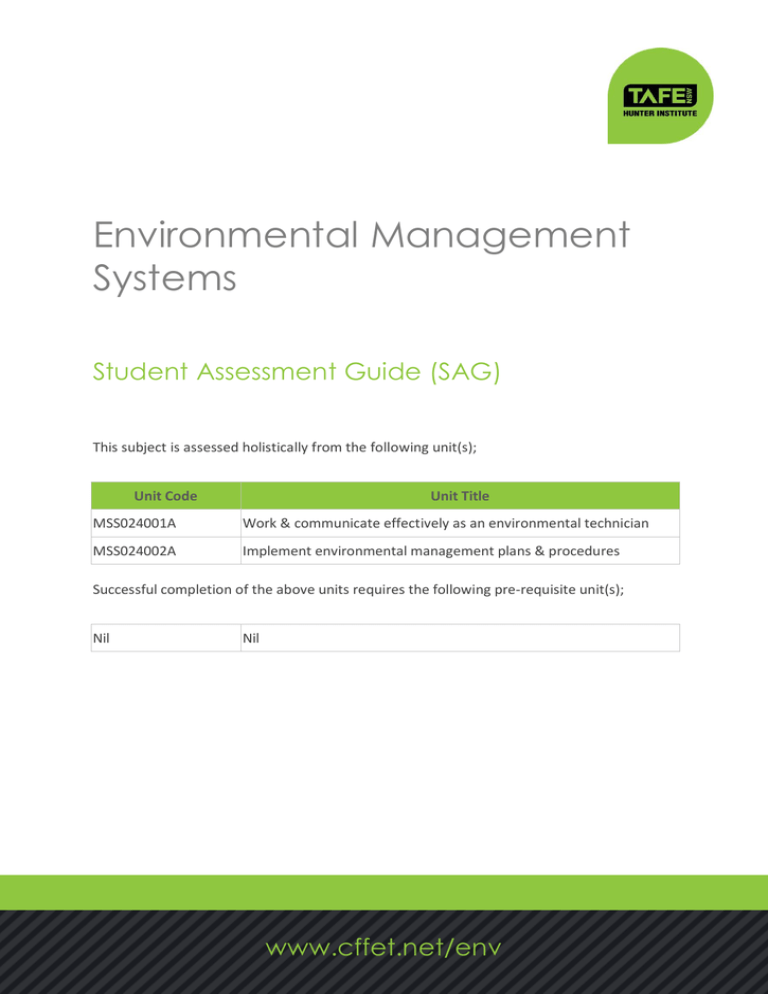
Environmental Management Systems Student Assessment Guide (SAG) This subject is assessed holistically from the following unit(s); Unit Code Unit Title MSS024001A Work & communicate effectively as an environmental technician MSS024002A Implement environmental management plans & procedures Successful completion of the above units requires the following pre-requisite unit(s); Nil Nil www.cffet.net/env Environmental Management Systems SAG Subject purpose This unit of competency covers the ability to apply environmental management plans and procedures to minimise the environmental impact of work activities and ensure legislative compliance. Personnel are required to identify environmental requirements in everyday work activities, issues and risks for projects and/or sites, recognise environmental incidents and apply the specified procedures or actions to control and minimise their impacts. The induction of an employee into an enterprise to undertake environmental technical work is also examined. It includes working within Australia’s framework for environmental management and the culture of the enterprise, and the need to interact effectively with a large range of people in many industry and community settings. Assessment Assessment for this subject will consist of theory study modules based on key aspects of implementing Environmental management Plans and assignments including; • A summary of environmental law and management in NSW • An EMP analysis assignment • A review of potential environmental issues and incidents • Discussion on the communication roles of environmental technicians There is substantial assignment and practical work required for this unit. Assessment Task Weighting Study modules (5) 50% EMP analysis 30% Environmental issues review 10% Environmental communication review 10% TOTAL 100% Subject content This subject deals with a wide variety of topics including the following aspects; Environmental legislation and regulations including; o National o State Chemical, Forensic, Food & Environmental Technology [cffet.net/env] Version 2.0 26/07/2014 Page | 1 Environmental Management Systems SAG o Local Division of intergovernmental powers in relation to environmental management Environmental quality indicator and guidelines for; o Waters o Air o Soils / land o Ecological systems Planning laws at national, state and local levels of government Environmental protection laws at national, state and local levels of government Environmental management plans covering; o Government project management o Industrial project management o Planning versus operational management plans o Data storage Administrative and managerial aspects of environmental management Management of data Grading The assessment for MSS024001A component is recorded as either Achieved Competency (AC) or Not Yet Competent (NC). The assessment for the MSS024002A component is recorded as a Class Mark. All assessment events used to determine your result will be locally set and locally marked. Your results will be reported as DISTINCTION, CREDIT, PASS (AC) or FAIL (NYC). To receive a particular grade you must get at least the mark shown below: Grade Class mark DISTINCTION >=83 CREDIT >=70 PASS (ACHIEVED COMPETENCY) >=50 FAIL (NOT YET COMPETENT) <50 Chemical, Forensic, Food & Environmental Technology [cffet.net/env] Version 2.0 26/07/2014 Page | 2 Environmental Management Systems SAG Delivery strategy This subject is assessed directly against the unit’s performance criteria. Elements Performance Criteria Subject Weighting Unit Weighting MSS024001A E 1, 2 & 3 1.1, 1.2 2.1, 2.2, 3.1 & 3.2 20% 50% MSS024002A ALL ALL 80% 100% Unit NOTE: The subject weighting MUST add up to 100 for the subject, but the Unit Weighting MAY NOT add up to 100 as each unit is weighted differently in each subject it is used in. Refer to cffet.net/env/assessment for further explanation. What you will need To complete this subject successfully you will need; • The course notes • A USB flash or thumb drive. • Access to a computer with internet, email and general office programs • General computer skills Where to get help Contact your teacher [www.cffet.net/env/contacts] if you run into any trouble this unit. You would be surprised how flexible we are at accommodating your needs, but communication is key. If you don’t let us know you are having trouble, we may have trouble trying to help you. Chemical, Forensic, Food & Environmental Technology [cffet.net/env] Version 2.0 26/07/2014 Page | 3 Environmental Management Systems SAG Resources and references References Note that you are not required to purchase, download or read these references (unless specifically directed to by your teacher). Some of these resources might be available from your teacher or library for free. Bates, G. (2010). Environmental Law in Australia. Australia: LexisNexis-Butterworths. DSEWPC. (2010, October 27). Australia's Biodiversity Conservation Strategy. Retrieved May 27, 2013, from environment.gov.au: http://www.environment.gov.au/biodiversity/strategy/states-territories.html Farrier, D. (. (2011). The Environmental Law Handbook. Sydney: Thomson Reuters. Jorgensen, S. E. (2005). Handbook of Ecological Indicators for Assessment of Ecosystem Health. Boca Raton: CRC Press. StandardsAustralia. (2004). AS/NZS ISO 14001:2004 Environmental Management Systems: Requirements with guidance for use. Australia: Standards Australia. Workplace Health and Safety Regulation 2011. (n.d.). ANAO. (2012). Public Sector Environmental Management: Reducing the environmental impacts of public sector operations. Better practice guide. Canberra: Commonwealth of Australia. Burden, F. E. (2002). Environmental Monitoring Handbook. McGraw-Hill Professional. DEWHA. (2009). Independant review of Environmental Protection and Biodiversity Conservation Act 1999: Chapter 2, Commonwealth role and EPBC Act objectives. . Canberra: Department of Environment, Water, Heritage and Arts. DIPNR. (2004). Guideline for the preapration of Environmental Management Plans. Sydney: DIPNR. DSEWPC. (2013, February 14). Intergovernmental Agreement on the Environment. Retrieved from Ecologically Sustainable Development: http://www.environment.gov.au/about/esd/publications/igae/index.html Environmental Protection and Biodiversity Conservation Act 1999. (n.d.). EPA, N. (1996). Environmental Guidelines: Solid Waste Lanfills. Chatswood: Environmental Protection Authority. ESDSC. (1992). National Strategy for Ecologically Sustainable Development. Canberra: Department of Sustainability, Environment, Water, Populations and Communities. UNCED. (1992). Agenda 21. United Nations Conference on Environment & Development. Rio de Janeiro: UNSD. Chemical, Forensic, Food & Environmental Technology [cffet.net/env] Version 2.0 26/07/2014 Page | 4 Environmental Management Systems SAG Resources Information on environmental law can be found at the EDO here. Current Commonwealth legislation can be found here. Current State legislation can be found here. NSW environmental planning materials can be found here. NSW environmental protection information (EPA) can be found here. Commonwealth EPBC Act website is here. Local Government information can be found here. Assessment Submission Students are to submit all assessments by the due date to the subject teacher by email using the following filename format; yourname-assessmentname-duedate Visit www.cffet.net/env/assessment for more information on submitting assessments, file names and available file extensions that you can use. Chemical, Forensic, Food & Environmental Technology [cffet.net/env] Version 2.0 26/07/2014 Page | 5
